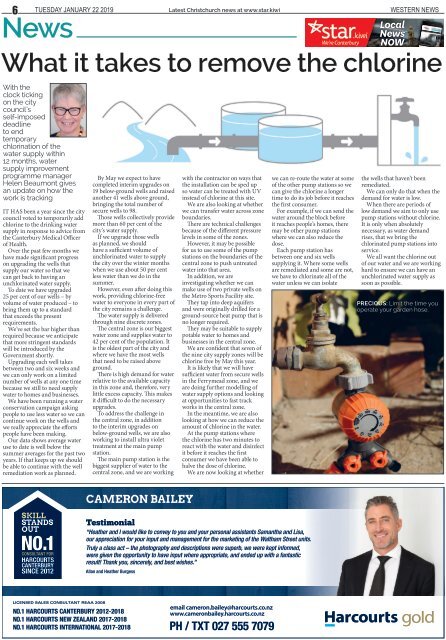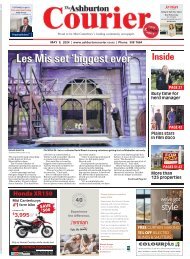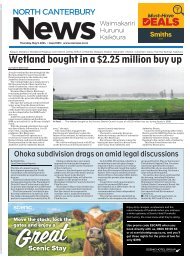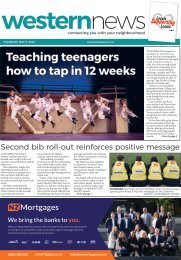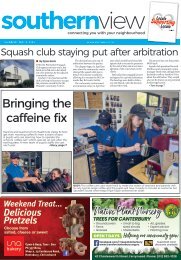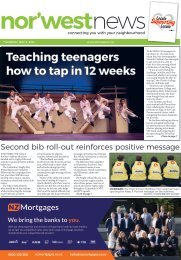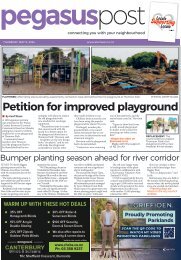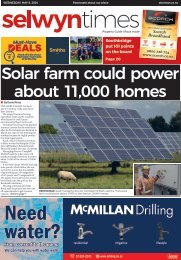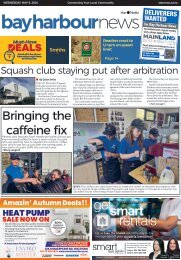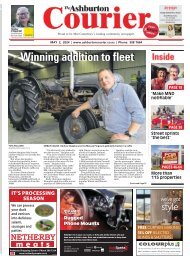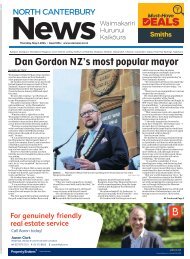You also want an ePaper? Increase the reach of your titles
YUMPU automatically turns print PDFs into web optimized ePapers that Google loves.
6 Tuesday <strong>January</strong> <strong>22</strong> <strong>2019</strong><br />
Latest Christchurch news at www.star.kiwi<br />
<strong>News</strong><br />
WESTERN NEWS<br />
Local<br />
<strong>News</strong><br />
Now<br />
What it takes to remove the chlorine<br />
Fire rages, homes at risk<br />
With the<br />
clock ticking<br />
on the city<br />
council’s<br />
self-imposed<br />
deadline<br />
to end<br />
temporary<br />
chlorination of the<br />
water supply within<br />
12 months, water<br />
supply improvement<br />
programme manager<br />
Helen Beaumont gives<br />
an update on how the<br />
work is tracking<br />
IT HAS been a year since the city<br />
council voted to temporarily add<br />
chlorine to the drinking water<br />
supply in response to advice from<br />
the Canterbury Medical Officer<br />
of Health.<br />
Over the past few months we<br />
have made significant progress<br />
on upgrading the wells that<br />
supply our water so that we<br />
can get back to having an<br />
unchlorinated water supply.<br />
To date we have upgraded<br />
25 per cent of our wells – by<br />
volume of water produced – to<br />
bring them up to a standard<br />
that exceeds the present<br />
requirements.<br />
We’ve set the bar higher than<br />
required because we anticipate<br />
that more stringent standards<br />
will be introduced by the<br />
Government shortly.<br />
Upgrading each well takes<br />
between two and six weeks and<br />
we can only work on a limited<br />
number of wells at any one time<br />
because we still to need supply<br />
water to homes and businesses.<br />
We have been running a water<br />
conservation campaign asking<br />
people to use less water so we can<br />
continue work on the wells and<br />
we really appreciate the efforts<br />
people have been making.<br />
Our data shows average water<br />
use to date is well below the<br />
summer averages for the past two<br />
years. If that keeps up we should<br />
be able to continue with the well<br />
remediation work as planned.<br />
By May we expect to have<br />
completed interim upgrades on<br />
19 below-ground wells and raised<br />
another 41 wells above ground,<br />
bringing the total number of<br />
secure wells to 98.<br />
Those wells collectively provide<br />
more than 60 per cent of the<br />
city’s water supply.<br />
If we upgrade those wells<br />
as planned, we should<br />
have a sufficient volume of<br />
unchlorinated water to supply<br />
the city over the winter months<br />
when we use about 50 per cent<br />
less water than we do in the<br />
summer.<br />
However, even after doing this<br />
work, providing chlorine-free<br />
water to everyone in every part of<br />
the city remains a challenge.<br />
The water supply is delivered<br />
through nine discrete zones.<br />
The central zone is our biggest<br />
water zone and supplies water to<br />
42 per cent of the population. It<br />
is the oldest part of the city and<br />
where we have the most wells<br />
that need to be raised above<br />
ground.<br />
There is high demand for water<br />
relative to the available capacity<br />
in this zone and, therefore, very<br />
little excess capacity. This makes<br />
it difficult to do the necessary<br />
upgrades.<br />
To address the challenge in<br />
the central zone, in addition<br />
to the interim upgrades on<br />
below-ground wells, we are also<br />
working to install ultra violet<br />
treatment at the main pump<br />
station.<br />
The main pump station is the<br />
biggest supplier of water to the<br />
central zone, and we are working<br />
with the contractor on ways that<br />
the installation can be sped up<br />
so water can be treated with UV<br />
instead of chlorine at this site.<br />
We are also looking at whether<br />
we can transfer water across zone<br />
boundaries.<br />
There are technical challenges<br />
because of the different pressure<br />
levels in some of the zones.<br />
However, it may be possible<br />
for us to use some of the pump<br />
stations on the boundaries of the<br />
central zone to push untreated<br />
water into that area.<br />
In addition, we are<br />
investigating whether we can<br />
make use of two private wells on<br />
the Metro Sports Facility site.<br />
They tap into deep aquifers<br />
and were originally drilled for a<br />
ground-source heat pump that is<br />
no longer required.<br />
They may be suitable to supply<br />
potable water to homes and<br />
businesses in the central zone.<br />
We are confident that seven of<br />
the nine city supply zones will be<br />
chlorine free by May this year.<br />
It is likely that we will have<br />
sufficient water from secure wells<br />
in the Ferrymead zone, and we<br />
are doing further modelling of<br />
water supply options and looking<br />
at opportunities to fast track<br />
works in the central zone.<br />
In the meantime, we are also<br />
looking at how we can reduce the<br />
amount of chlorine in the water.<br />
At the pump stations where<br />
the chlorine has two minutes to<br />
react with the water and disinfect<br />
it before it reaches the first<br />
consumer we have been able to<br />
halve the dose of chlorine.<br />
We are now looking at whether<br />
we can re-route the water at some<br />
of the other pump stations so we<br />
can give the chlorine a longer<br />
time to do its job before it reaches<br />
the first consumer.<br />
For example, if we can send the<br />
water around the block before<br />
it reaches people’s homes, there<br />
may be other pump stations<br />
where we can also reduce the<br />
dose.<br />
Each pump station has<br />
between one and six wells<br />
supplying it. Where some wells<br />
are remediated and some are not,<br />
we have to chlorinate all of the<br />
water unless we can isolate<br />
the wells that haven’t been<br />
remediated.<br />
We can only do that when the<br />
demand for water is low.<br />
When there are periods of<br />
low demand we aim to only use<br />
pump stations without chlorine.<br />
It is only when absolutely<br />
necessary, as water demand<br />
rises, that we bring the<br />
chlorinated pump stations into<br />
service.<br />
We all want the chlorine out<br />
of our water and we are working<br />
hard to ensure we can have an<br />
unchlorinated water supply as<br />
soon as possible.<br />
PRECIOUS: Limit the time you<br />
operate your garden hose.<br />
CAMERON BAILEY<br />
Testimonial<br />
“Heather and I would like to convey to you and your personal assistants Samantha and Lisa,<br />
our appreciation for your input and management for the marketing of the Waltham Street units.<br />
Truly a class act – the photography and descriptions were superb, we were kept informed,<br />
were given the opportunity to have input where appropriate, and ended up with a fantastic<br />
result! Thank you, sincerely, and best wishes.”<br />
Allan and Heather Burgess<br />
NO.1 HARCOURTS CANTERBURY 2012-2018<br />
NO.1 HARCOURTS NEW ZEALAND 2017-2018<br />
NO.1 HARCOURTS INTERNATIONAL 2017-2018


